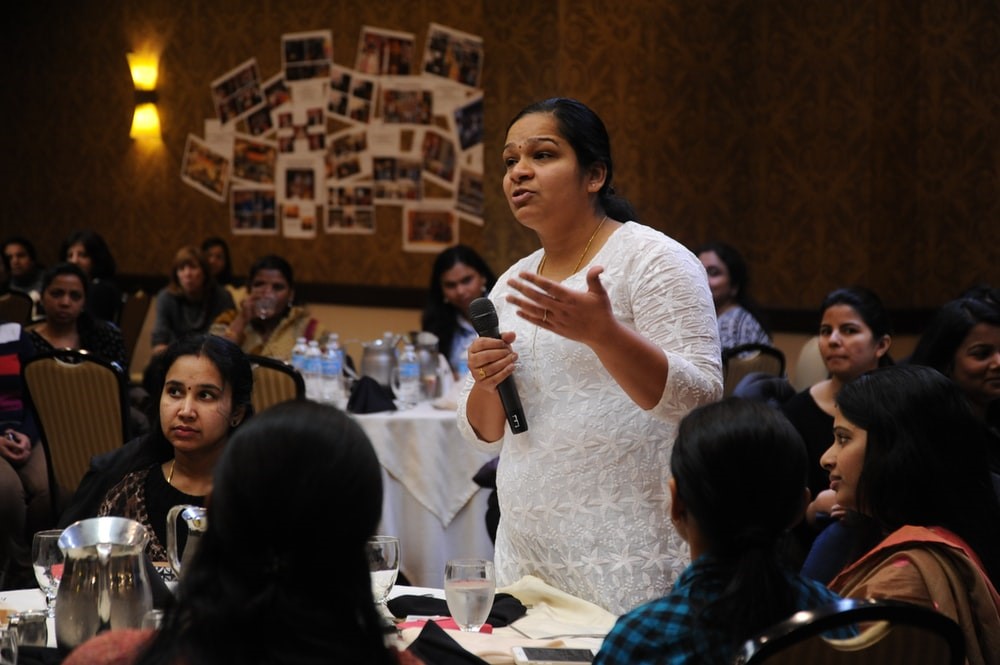Introduction
We all face stress from time to time. How our body reacts to the challenges of daily events is perceived as stress. Although, a little bit of stress can push us to perform our duties and responsibilities well, experiencing stress over a prolonged period can have serious repercussions pertaining to our overall wellbeing. Also, stress manifests differently in different people. For instance, stress affects women in more ways than men. Moreover, chronic stress can accumulate in such a way that it starts looking like a conventional way of life for many women. This can lead to stress symptoms in women that manifest at physical, emotional and mental levels that compromises their mental peace and affects their ability to .
Women, wherever they are in the world, are hardwired to take on more responsibilities like household chores and childcare in addition to professional commitments. This can be attributed to socioeconomic inequality, gender bias, their traditionally perceived roles and other such factors.
Hence, this article delves into the causes of stress and effects of stress in women. It further explores ways to deal with stress in women using natural alternatives such as yoga, nutrition, and meditation.
Common Causes of Stress in Women
Today, women need to juggle multiple roles, spanning their professional as well as personal lives. A woman needs to juggle multiple responsibilities irrespective of her education level or professional accomplishment. In fact, a Nielsen survey called Women of Tomorrow, conducted in 2011 on 6,500 women respondents from 21 countries, found that women in developing countries are the most stressed in the world! An astounding 87% of women said that they were stressed, with about 82% of women claiming that they never had time to relax. This alarming statistic puts focus on the causal stressors that women need to endure in her day-to-day life. Let’s take a look.

Occupational stress: Though companies around the world these days claim to be 21st century workplaces, very few companies have actually made their policies more women friendly. Lack of creches, long working hours, increased workload, difficult maternity leave policies and lack of pay parity are still some of the issues plaguing workplaces, giving little to no leeway to women who want to succeed at work.
Lack of social support: This especially holds true for working women. In traditional societies, working women face challenges such as missing physical infrastructure like creche facilities at workplaces and lack of social support such as reliable house help or elderly relatives to take care of children and other household duties. Due to these bottlenecks, many educated women stop working or go on long sabbaticals, which affect their career path and growth.
Social expectations: Social expectations are such that a woman, irrespective of her working status, is expected to manage household chores, relationships and look after children. Many of these women are the first-generation women in their family to go out and work. But, the workload at home stresses them out. Though being assertive at workplace is imperative, voicing similar concerns at home is often met with disgruntled looks and a lack of empathy. While travelling for work, networking and putting in long hours at work might be perceived critical to succeeding at work, returning home at a specified hour every day is an unspoken rule and expectation in many Indian households.
Expectations from self: In this age of Instagram and LinkedIn, where looking good as well as succeeding in the rat race is more desirable than ever, women put undue pressure on themselves to perform and succeed at every level. This holds true especially for urban women, who, with a decent job and education, have ambitions and aspirations to perform well in multiple areas.
The above-mentioned causes usually fuel stress symptoms in women, leading to serious manifestations pertaining to physical as well as emotional stress symptoms in women.
What are the Symptoms of Stress in Women?
Each woman reacts to stress triggers in distinctive ways. Chronic stress symptoms in women include physical, emotional, mental as well as social manifestations. Let’s delve into these symptoms in some more detail.
Physical Symptoms of Stress in Women
Stress symptoms in women show up physically or in a psychosomatic way, such as:
- Early ageing: Stress leads to alteration of the skin’s proteins, which makes it lose its elasticity. This can lead to formation of wrinkles. Moreover, the repeated furrowing of brows can also cause wrinkles.
- Skin problems: Stressed women face acne issues and other skin problems like hives or rashes.
- Hair loss and greying hair: Studies have proven that stress can actually lead to grey hair. Moreover, lack of proper nutrition coupled with insufficient sleep and little or no time to relax can cause hair loss in women. Furthermore, researchers have found through animal studies that a stress hormone impairs the ability of stem cells to grow new hair.
- Endocrine problems: Stress symptoms in women can manifest as Type II diabetes and hypothyroidism or hyperthyroidism in women. These metabolic disorders further aggravate into gynaecological problems and obesity, which reduce the quality of life in women.
- Weight gain and obesity: Studies show that women are more likely than men to gain weight in case of chronic stress. Increased levels of the cortisol hormone in the body can lead to overeating and cause more storing of fat.
- Hormonal imbalance: Stress can interfere with the delicate hormonal balance in women, leading to issues such as polycystic ovary syndrome (PCOS), premenstrual syndrome (PMS), irregular periods, menopausal issues such as hot flashes and even infertility.
- Cardiac problems: Stress leads to raised levels of heart rate and blood pressure, leading to strokes and heart attacks.
- Headaches and migraines: We all experience headaches. However, tension headaches are more common in women than men when under stress. Migraines are more debilitating forms of headache, mostly triggered by stress or changes in temperatures or diet. The American Headache Society says that a majority of people suffering from migraine reported stress as a trigger. What’s more disturbing is the fact that women are three times more likely than men to experience this neurological disease.
- Digestive problems: The checklist of stress symptoms in women also include digestion problems such as irritable bowel syndrome. In fact, studies have shown the correlation between stress and gastrointestinal discomfort in women under stress.
- Pregnancy problems: Stress symptoms in women can also show up as the inability to conceive or carry the pregnancy to full term. Moreover, women facing high stress levels also take longer to conceive.
Mental and emotional stress symptoms in women

Besides experiencing debilitating physical symptoms, many women suffer from myriad mental and emotional problems due to chronic stress. Some of these symptoms are listed below:
- Anxiety: Studies show that women are more likely than men to suffer from an anxiety related disorder such as panic disorder, obsessive compulsive disorder and post-traumatic stress disorder. Research suggests that women may experience and feel more symptoms of stress than men, thus raising their propensity of having anxiety.
- Depression: Anxiety and stress symptoms in women can lead to depression. Depression can show up in subtle ways like angry outbursts, mood swings, lack of energy and general apathy. Moreover, one can experience a lack of interest or motivation to do things, have feelings of sadness and frustration, and even experience suicidal thoughts.
- Loss of mental acuity: Stress symptoms in women can lead to a lack of focus and reduced concentration. Worry and forgetfulness can fuel a lack of decision-making power as well.
- Insomnia: Insomnia is one of the predominant symptoms of stress and anxiety in women. Studies show that women suffer more than men from insomnia in terms of its symptoms as well as its daytime ramifications. Women who are stressed find it difficult to fall asleep and stay asleep during the night. This further aggravates anxiety and depression, creating a vicious cycle which is difficult to overcome.
These emotional and mental stress symptoms in women lead to wider social, occupational and personal consequences, such as feeling unfulfilled at work, social isolation or social awkwardness and loneliness. Women might also experience tense relations at office and home, less interest in sex or intimacy, and decreased affection for partner. Despair, guilt and doubt might engulf women, leading to feelings of emptiness and apathy towards life in general.
How to deal with stress in women?
It is easy to see that stress symptoms in women can snowball into serious problems. However, women can take charge of their life and not let stress hold them back from leading happier and more fulfilling lives. Women need to exercise natural self-care strategies to cope with the many stressors that they face in their daily life. Since these strategies are completely holistic and revolve around yoga, meditation, and nutrition, they don’t have any side effects and offer lifelong results. Below are some suggestions that women can incorporate in various areas of their life.

- Ensure physical wellbeing: Women, in their quest to take care of others’ needs, often forget to take care of themselves. Getting enough sleep, eating a nutritious diet, regularly exercising and making time for favourite activities like reading or listening to music are some things that women should adopt to keep stress at bay. Incorporating gentle and calming, yet very effective remedies, such as yoga and meditation, have proven to be very effective in preventing and reducing stress.
- Maintaining emotional wellbeing: It’s imperative for women to express their emotions. The ability to say no to people and refusal to fulfil the many demanding social obligations generally fuelled by gender bias need to become learnt behaviours in women. Asserting oneself in a more positive way can lead to enhanced self-esteem.
- Creating boundaries at work and home: Stress symptoms in women can be better managed if women learn to set limits and realistic expectations at work and at home. They need to speak up when they feel that work deadlines are not realistic, or they are being bullied at work. Identifying work-life balance by setting doable goals both at work and home is important too. This can be done by keeping a tab on energy levels as well as disposable time at hand. Women need to delegate tasks at home and not shy away from seeking help from family members.
- Social connections: Stress symptoms in women can subside if they strive to create meaningful relationships while also establishing healthy limits. Staying connected with friends and loved ones is a good idea. Having candid chats with trusted friends can lift their mood and lighten up their soul in more ways than one.
- Practise gratitude: In the humdrum of daily life, women often forget to stay in the present moment and enjoy the simple yet profound things in life. Enjoying early morning nature walks or bedtime reading sessions can help, for instance. Being thankful for what she has, and mindfully practising gratitude can have an immense positive impact on a woman’s psyche.
Yoga to Beat Stress Symptoms in Women
Besides the above suggestions, yoga for stress is a powerful intervention that women can incorporate in their daily lives. Yoga is a holistic science that amalgamates asanas or exercises and breath control for gaining optimal physical and mental wellbeing.
Stress can increase the cortisol levels in our bodies. However, research has shown that regular practise of yoga can lower cortisol levels. Anxiety is a by-product of stress. A 2016 meta-analysis has shown that regularly practising Hatha yoga can help relieve anxiety.
Below is a list of yoga asanas that not only work to beat stress symptoms in women, but also relieve other ailments such as back pain, menstrual problems and tiredness.

Besides the above suggestions, yoga for stress is a powerful intervention that women can incorporate in their daily lives. Yoga is a holistic science that amalgamates asanas or exercises and breath control for gaining optimal physical and mental wellbeing.
Stress can increase the cortisol levels in our bodies. However, research has shown that regular practise of yoga can lower cortisol levels. Anxiety is a by-product of stress. A 2016 meta-analysis has shown that regularly practising Hatha yoga can help relieve anxiety.
Below is a list of yoga asanas that not only work to beat stress symptoms in women, but also relieve other ailments such as back pain, menstrual problems and tiredness.
- Suryanamaskar (Sun salutation)
- Sukhasana (The easy pose)
- Balasana (Child’s pose)
- Paschimottanasana (Seated forward bend)
- Ananda Balasana (Happy baby pose)
- Uttanasana (Standing forward bend)
- Adho mukha svanasana (Downward facing dog)
- Marjaryasana (Cat-cow pose)
- Salabhasana (Locust pose)
- Dhanurasana (Bow pose)
- Ustrasana (Camel pose)
- Bhujangasana (Cobra pose)
- Shavasana (Corpse pose)
Read – All About Tadasana Yoga Pose, Steps, Benefits, and More
Pranayama (Breathing Exercises) For Relieving Stress Symptoms in Women
Any yoga practise is incomplete without practising pranayama or breathing exercises. Pranayama usually follows the asana practise and includes, but is not limited to, the following breathing-centric exercises:
- Kapalbhati
- Anulom-vilom
- Bhastrika
- Ujjayi pranayama
- Nadi shodhana
- Brahmari
Pranayam can be practised by women to alleviate stress. Besides, incorporating meditation in the yoga routine can also go a long way in managing stress symptoms in women. Meditation is a great way to quieten your mind and eliminate jumbled stressful thoughts that often trigger emotional meltdowns.
Practising meditation everyday regulates your heart rate, reduces the production of stress hormones, and helps you deal with triggers of stress better
However, it should be kept in mind that yoga should be practised only under the supervision of an expert yoga practitioner who can create a tailored plan as per a woman’s fitness levels and medical problems.
The Bottomline
Stress symptoms in women, if not addressed, can lead to poor quality of life. However, there are many things that women can do to lead more fuller lives. Incorporating practises like yoga, pranayama and meditation can help in managing stress symptoms in women. Interventions at the physical, emotional and social levels can help women deal more effectively with the omnipresent stressors in their lives.
Read – Different Types of Meditation for Stress
Commonly Asked Questions for Stress Symptoms in Women
How can I identify stress symptoms in myself or others?
Recognizing stress symptoms in females involves paying attention to both physical and emotional cues. Common signs may include headaches, muscle tension, irregular menstrual cycles, or changes in sleep patterns. Emotional indicators may range from mood swings and increased anxiety to feelings of overwhelm. Observing shifts in self-care habits, such as changes in eating patterns or a decrease in social activities, can also signal stress. If these symptoms persist, seeking support from healthcare professionals or loved ones is essential for managing stress effectively.
What are the emotional and behavioral signs of stress in women?
Emotional exhaustion or feeling on-edge often arise first. Gradually worsening physical issues like back tightness can compound over time too. Without support, panic attacks, painful stomach troubles, or severe migraines could occur for some. Getting assistance when any new or worsening symptoms appear speeds relief.
What are some effective stress management techniques for women?
According to large American Psychological Association studies, regular exercise, sufficient sleep, nutritious eating and leisure time all help women manage tension effectively. Meditative practices like journaling, breathwork and yoga also have decades of data supporting efficacy. Small, consistent supportive tools tend to work better long-run than extreme quick fixes.
When should I seek professional help for stress?
If unmanaged exhaustion, physical discomforts, or emotional issues increasingly disrupt work or home life, seeking outside guidance can offer much needed skills for navigating through especially during demanding times. Prioritizing some self-reflection now goes a long way toward preventing larger health complications down the road.
What are the early signs of stress in women?
Researchers found subtle red flags like appetite changes, low motivation, fatigue, or frequent headaches often emerge first, but get overlooked until worsening. Left unaddressed over weeks, minor discomforts can snowball into chronic conditions like back pain or mood disorders. Attending small signals early makes realigning easier. Regular self-care also strengthens resilience.
What are the long term effects of stress on women's health?
Decades of gold-standard Mayo Clinic research confirms clear links between prolonged high stress and increased obesity, memory decline, high blood pressure and heart issues in women as specific examples. This connects to science around inflammatory stress hormones and gradual organ damage over time. Establishing healthy lifelong habits early on assists with long-term wellness.
What are some less common but still important signs of stress in women?
While common symptoms get discussed frequently, data from many researches suggests that less common stress indicators in women include irregular periods, skin issues, hair changes, digestive problems, and alterations in libido. Cognitive issues, physical pains, or changes in taste/smell may also signal stress. Recognizing these signs is vital for a holistic understanding of women's well-being, and seeking guidance from healthcare professionals is advised if these symptoms persist.
How can I differentiate between stress symptoms and other medical conditions?
Carefully reviewing family history, timing, onset contributors and any medication side effects allows tailored insight into all drivers of symptoms - anxiety-fueled or otherwise. This clarity around root causes aids more holistic support for proactively addressing high stress and related fallout.
What are some lifestyle changes I can make to reduce stress symptoms?
Small, gradual steps better support, sustainable change - like brief relaxation practices or nutrition upgrades rather than extreme changes leading to quick burnout. Reasonable self-care makes balancing everything feel far less intimidating so positive changes endure over the long run. That’s the ultimate goal!


